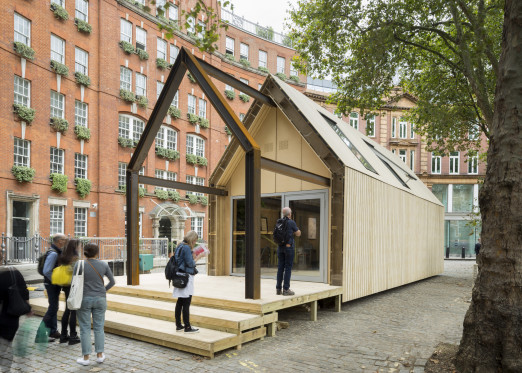Mycopackaging is created using mycelium, a part of a mushroom often submerged in another body. Agricultural waste is cleaned and mycelium is introduced, which then grows and is shaped in a mold. The mycelium acts as a glue for the now-cleaned waste. Unlike the more commonly used polystyrene, this packaging material decomposes in a few months. Mycelium is also used as a glue to create a wide range of materials, such as wooden boards and insulation panels.
Regenerate / Exchange
Packaging, board. Ecovative (Agricultural waste, mycelium Troy, NY, 2015)
Interview with Co-Founder and Ecovative CEO Eben Bayer
Ecovative is 10 years old this year, can you tell us abut the origin, scope and evolution of the company?
Eben Bayer: Ecovative Design emerged from a university innovation class project and has grown to become the pioneer and world leader in mycelium-based biomaterials. We use biology to grow materials with exceptional properties unattainable through conventional chemistry. Together with co-founder Gavin McIntyre, we have built the company on the break-through idea to use mycellium—“nature’s glue”—to grow high performance, premium, award-winning products for the home and office that are safe, healthy, and certified sustainable.
In a quest to replace polystyrene (we call it “that toxic white stuff”), we created compostable MycoFoam™ packaging materials, now used by Dell and others. In a quest for a solution to the dangers of formaldehyde in engineered wood, our team (now 80+) created formaldehyde and toxin-free MycoBoard™ panels, now used in chairs, desks, wall tiles, and other consumer goods in the Ecovative Interiors line. Ecovative products enable customers—including Fortune 500 companies, international mills, and furniture makers—to meet their design, production, and delivery needs while achieving sustainability goals.
What kinds of educational and professional backgrounds do the company’s management and team have?
Eben Bayer: Ecovative’s 80+ workforce includes engineers, biologists, mycologists, designers, architects, artists, salespeople, and production workers.
Ecovative’s materials – including MycoBoard™ panels, MycoFoam™ packaging materials, and our Grow It Yourself (GIY) kits – are grown to displace toxic chemicals in products such as polystyrene (including Styrofoam), which are building up in landfills and choking our oceans, and urea formaldehyde resins, the cancer-causing glues in most particleboard. Our materials are compostable, formaldehyde-free and therefore safe, healthy, and sustainable.
What kind of market research did you do and what insights did you get?
Eben Bayer: As the pioneer in biofabricating mycelium-based products, we created and built our own industry as the premier biomaterials company in the world. In our quest to replace plastic foams, we factored in the full life cycle costs of polystyrene—including environmental and health—to producers, consumers, and the planet. We also recognized that the escalating economic and health costs of production of engineered wood using formaldehyde and other toxic resins is unsustainable, and therefore a product and industry ripe for disruption.
How would you describe the different mindsets of circular thinking/design for the CE versus traditional linear thinking for the linear economy?
Eben Bayer: A circular economy mindset addresses not just monetary costs, but the ultimate cost to the planet and its people. At Ecovative, we are mindful of the full life cycle of our products. We begin with agricultural waste; thereby creating a new revenue stream for farmers. We use safe and healthy biomaterials, rather than toxic chemicals such as formaldehyde, in our production process; making it safer for manufactures. And our final products do not emit noxious gases, and are fully compostable at the end of useful life; therefore healthier for consumers and the planet.
What has been the most challenging part of the process?
Eben Bayer: Creating a new materials science by definition requires complex scientific research and engineering, of course. But introducing disruptive technologies to existing industries also requires educating and exciting both the producers and consumers.
What has the reaction been so far?
Eben Bayer: Clearly there is a growing awareness of the need for each of us to make changes, large and small, to create safer, healthier environments for ourselves and the planet. Ecovative’s Mushroom® Materials offer a sustainable full-life-cycle solution. Many of our customers are passionate about our products, and want to know how they can be involved with our process or our materials. Our clients range from international furniture makers, to boutique lighting shops, to Fortune 500 companies, to individual innovators and educators; all seeking to produce and/or use products that fuel the circular economy.
Next steps?
Eben Bayer: We look forward to continuing to grow our MycoBoard™ engineered wood business, both by expanding our Ecovative Interiors line of furnishings for the home and office and by converting existing mills to incorporate Ecovative’s safe and healthy production process. We will further accelerate sustainable disruption in these markets by expanding business partnerships to achieve global reach of our mResin™ technologies.
For anyone interested in this field, what books or articles would you recommend to read?
Eben Bayer: Radical Mycology by Peter McCoy, Mycelium Running by Paul Stamets, and of course any of the speeches and/or scientific papers co-authored by co-founders Eben Bayer and Gavin McIntyre.


